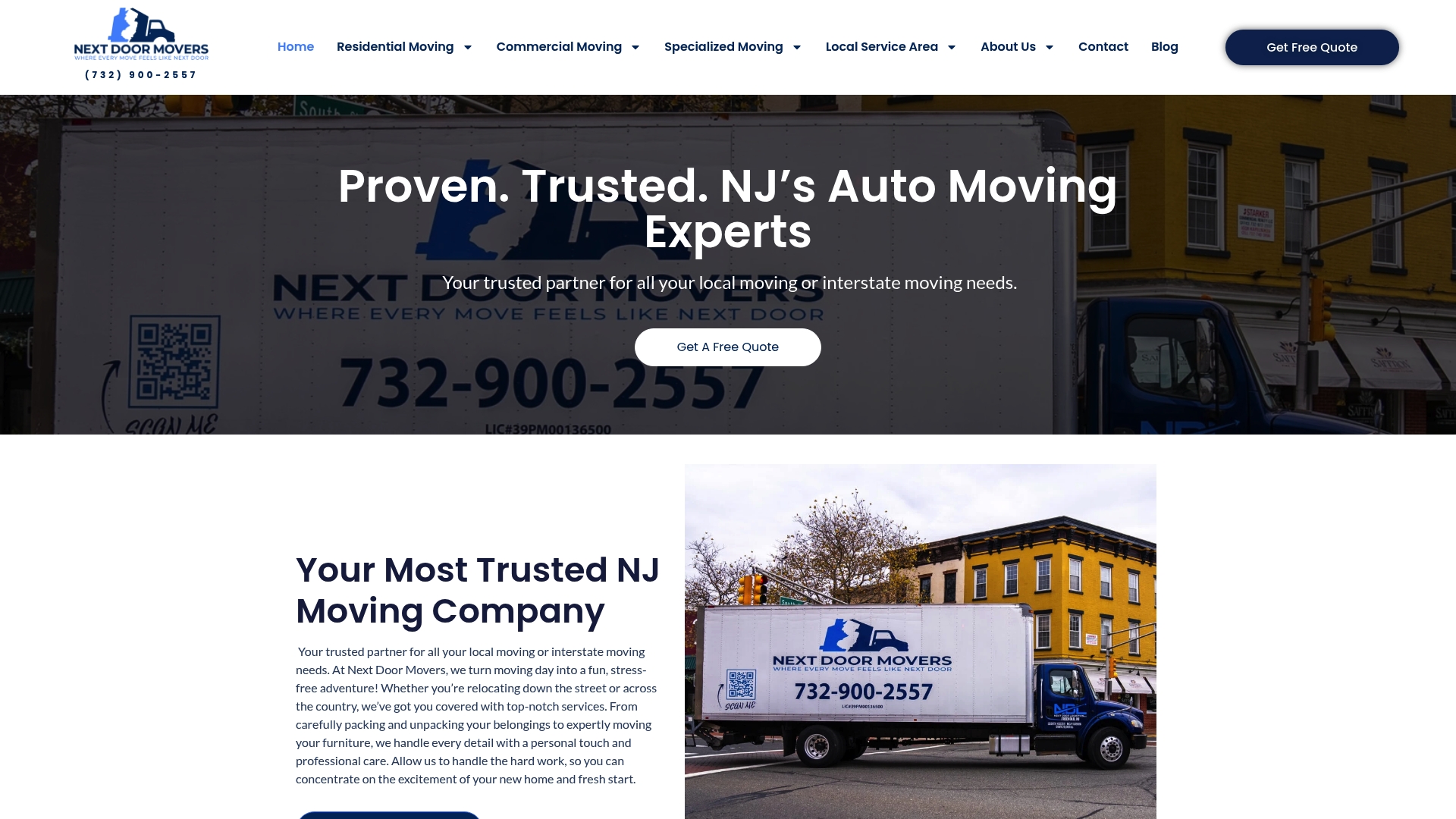Moving companies handle much more than just hauling boxes across town. Professional movers now manage everything from custom packing with industrial-grade materials to providing insurance coverage and full coordination for complex relocations. Most people expect sweat and chaos, maybe a few broken plates. What they do not realize is that hiring a moving company does not just shift your stuff. It actually gives you legal protection, lowers your injury risk, and turns moving day into a well-organized operation.
Table of Contents
- What Are The Core Services Provided By Moving Companies?
- Why Engaging A Moving Company Matters For Relocation
- How Moving Companies Coordinate The Moving Process
- Key Terminology And Concepts In The Moving Industry
Quick Summary
| Takeaway | Explanation |
|---|---|
| Professional packing reduces damage risk. | Expert packing techniques and quality materials safeguard fragile items, ensuring they arrive intact at your new location. |
| Moving involves more than transport. | It includes safety, legal compliance, and comprehensive planning, transforming a daunting task into an organized process. |
| Understanding moving terminology is crucial. | Familiarity with key terms and documents helps customers make informed decisions regarding their relocation services. |
| Professional movers ensure safety and comfort. | Trained movers use proper equipment and techniques, minimizing personal injury risks during the moving process. |
| Engaging moving companies provides financial protection. | Licensed movers offer mandatory insurance and liability agreements, safeguarding your possessions throughout the move. |
What are the Core Services Provided by Moving Companies?
Moving companies offer comprehensive services designed to simplify the complex process of relocating households and businesses. Professional movers go far beyond simply transporting items from one location to another, providing a range of specialized solutions that address various logistical challenges.
Packing and Unpacking Services
One of the most critical services moving companies provide is professional packing and unpacking. Trained movers use specialized techniques and high-quality materials to protect delicate items, electronics, furniture, and valuable possessions. They systematically pack belongings using:
- Bubble wrap for fragile items
- Sturdy moving boxes in multiple sizes
- Protective padding for furniture
- Custom crating for unique or expensive objects
By handling the entire packing process, moving companies significantly reduce the risk of damage during transit and save customers substantial time and stress.
Loading, Transportation, and Unloading
Moving companies specialize in the careful loading, transportation, and unloading of household and commercial items. Professional movers utilize specialized equipment like furniture dollies, moving straps, and ramps to safely transfer items without causing damage. According to the Federal Motor Carrier Safety Administration, interstate moving companies must meet strict licensing and registration requirements to ensure safe and reliable transportation.
Additional Specialized Moving Services
Beyond basic moving services, many companies offer advanced solutions for complex relocations. These may include:
- Long-distance and interstate moving
- Commercial and office relocations
- Piano and specialty item moving
- Temporary and long-term storage options
- Furniture disassembly and reassembly
By providing comprehensive moving solutions, professional moving companies transform what could be an overwhelming experience into a streamlined, manageable process.
To help readers understand the wide range of moving company services, here is a breakdown of the core offerings and what each includes:
| Service Category | Description |
|---|---|
| Packing & Unpacking | Professional packing of items using quality materials; full unpacking at destination |
| Loading & Unloading | Safe movement of items into and out of trucks using specialized equipment |
| Transportation | Secure transit of items to new location, compliant with all regulations |
| Specialized Services | Long-distance moves, office relocations, piano/specialty item handling |
| Furniture Disassembly/Reassembly | Dismantling and reassembling furniture for safe transport |
| Storage Solutions | Temporary or long-term storage options for belongings |
Why Engaging a Moving Company Matters for Relocation
Relocating involves much more than simply transporting belongings from one place to another. Professional moving companies provide critical services that transform a potentially stressful experience into a smooth, efficient transition.
Physical and Safety Considerations
Moving large and heavy items poses significant physical risks that most individuals are not prepared to handle. According to the National Institute for Occupational Safety and Health, improper lifting and moving techniques can lead to serious back injuries and long-term health complications. Professional movers are trained to:
- Use specialized equipment designed for safe item transportation
- Apply ergonomic lifting techniques
- Minimize personal injury risks
- Protect valuable and fragile possessions
Legal and Financial Protection
Engaging a professional moving company provides essential legal and financial safeguards. Moving companies are regulated and must adhere to strict industry standards, which means customers receive protection through:
- Mandatory insurance coverage
- Standardized liability agreements
- Transparent pricing structures
- Professional accountability for transported items
Comprehensive Relocation Management
Beyond physical transportation, professional movers offer comprehensive relocation solutions that address complex logistical challenges. They manage intricate details such as:
- Advanced planning and coordination
- Custom packing strategies
- Efficient loading and unloading protocols
- Potential storage solutions
- Specialized handling for unique or delicate items
By entrusting your move to professionals, you transform a potentially overwhelming process into a structured, manageable experience that reduces stress and ensures the safe transfer of your most important possessions.
How Moving Companies Coordinate the Moving Process
Moving companies employ sophisticated coordination strategies that transform complex relocations into seamless, well-orchestrated experiences. Professional movers utilize comprehensive planning frameworks that address every aspect of the moving journey, ensuring efficient and stress-free transitions for their clients.
Initial Planning and Assessment
The coordination process begins with a detailed initial consultation and assessment. Moving companies conduct thorough evaluations to understand the specific requirements of each relocation. According to the Federal Motor Carrier Safety Administration, this involves:
- Conducting comprehensive home or office surveys
- Calculating precise volume and weight of items
- Identifying special handling requirements
- Developing customized moving strategies
- Generating detailed moving estimates
Logistical Scheduling and Resource Allocation
Strategic resource management is crucial in moving coordination. Professional moving companies meticulously plan every logistical detail, including:

- Selecting appropriate transportation vehicles
- Assigning specialized moving teams
- Determining optimal moving dates
- Coordinating potential storage solutions
- Planning efficient loading and unloading sequences
Execution and Communication Management
Beyond physical transportation, full-service moving coordination involves continuous communication and real-time problem solving. Moving companies maintain transparent communication channels, providing clients with:
- Regular status updates
- Detailed inventory tracking
- Immediate response to unexpected challenges
- Comprehensive documentation
- Professional guidance throughout the moving process
By implementing these sophisticated coordination strategies, moving companies transform what could be a chaotic experience into a structured, predictable, and manageable transition.
Key Terminology and Concepts in the Moving Industry
Understanding moving industry terminology helps consumers navigate complex relocation processes with greater confidence and clarity. Professional moving services operate within a specialized language framework that defines critical aspects of transportation, liability, and customer protection.
Essential Moving Documentation
The moving industry relies on specific documentation that establishes legal and financial parameters for relocation services. According to the International Association of Movers, critical documents include:

- Bill of Lading: Official contract between movers and customers
- Inventory Sheet: Comprehensive list of transported items
- Estimate Document: Projected moving costs and service details
- Insurance Certificate: Coverage details for transported belongings
- Valuation Declaration: Statement of item worth and protection levels
Technical Moving Service Classifications
Moving companies utilize specific terminology to describe service levels and transportation methods. These technical classifications help customers understand exactly what services they are purchasing:
- Local Move: Relocation within 50 miles of origin
- Long-Distance Move: Transportation exceeding 50 miles
- Interstate Move: Crossing state boundaries
- Intrastate Move: Within same state boundaries
- Full-Service Move: Comprehensive packing, loading, and transportation
Pricing and Liability Terminology
Exploring moving compliance standards reveals complex pricing and liability structures. Key financial and legal terms include:
- Binding Estimate: Fixed price guarantee
- Non-Binding Estimate: Approximate cost subject to change
- Released Value Protection: Minimal complimentary coverage
- Full Value Protection: Comprehensive item replacement
- Accessorial Charges: Additional service fees
By familiarizing themselves with these terms, customers can make more informed decisions and set clear expectations during the moving process.
For easier understanding of industry-specific language, here are key moving terms and their definitions:
| Term | Definition |
|---|---|
| Bill of Lading | Official contract between movers and customers |
| Inventory Sheet | Comprehensive list of transported items |
| Estimate Document | Projected moving costs and service details |
| Insurance Certificate | Coverage details for transported belongings |
| Valuation Declaration | Statement of item worth and protection levels |
| Local Move | Relocation within 50 miles of origin |
| Long-Distance Move | Transportation exceeding 50 miles |
| Interstate Move | Move crossing state boundaries |
| Full-Service Move | Includes packing, loading, and transportation |
| Binding Estimate | Fixed price guarantee |
| Released Value Protection | Minimal complimentary coverage |
| Full Value Protection | Comprehensive item replacement |
Turn Moving Stress Into a Smooth Experience With Experts Who Care
Are you worried about the overwhelming challenges of packing, transporting fragile items, or facing surprise costs during your move? The article highlights how complex relocation can be, from understanding moving terminology to managing safety and insurance concerns. If you want to avoid back injuries, lost valuables, or hidden charges, it is crucial to partner with professionals who know how to handle every detail with care.

At Next Door Mover, you get more than basic moving help. You get complete support from a team that brings order and confidence to each step. Enjoy benefits like careful packing, safe specialty item transport, and clear communication from start to finish.
Ready for a move that is truly stress free? Visit Next Door Mover to discover how our local and long-distance relocation specialists can protect your valuables and guide you every step of the way. Request your free quote today and see why so many New Jersey families and businesses trust us for their peace of mind.
Frequently Asked Questions
What services do moving companies typically offer?
Moving companies offer a range of services, including professional packing and unpacking, loading and unloading, transportation of items, and additional specialized services like long-distance moving, commercial relocations, and storage options.
How do moving companies ensure the safety of my belongings during transit?
They use specialized packing techniques and materials, such as bubble wrap and sturdy boxes, to protect fragile items. Professional movers are trained in proper handling and transportation methods to minimize the risk of damage.
What should I consider when selecting a moving company?
Consider factors like the company’s licensing and insurance, types of services offered, customer reviews, and their experience with specific types of moves, such as long-distance or commercial relocations.
Are there different types of moving services available?
Yes, moving services can be classified into local moves (within 50 miles), long-distance moves (over 50 miles), interstate moves (across state lines), and full-service moves that include packing, loading, and transportation.
Recommended
- Choosing the Right Moving Companies for Your Needs | Next Door Mover
- Essential Services From Movers and Moving Companies Explained | Next Door Mover
- Trust New Jersey’s Movers for a Stress-Free Relocation
- Mastering My Door Move: A Professional Guide to Success | Next Door Mover
- How Removals Companies Work: Essential Guide for UK Moves 2025 | Schott Removals
